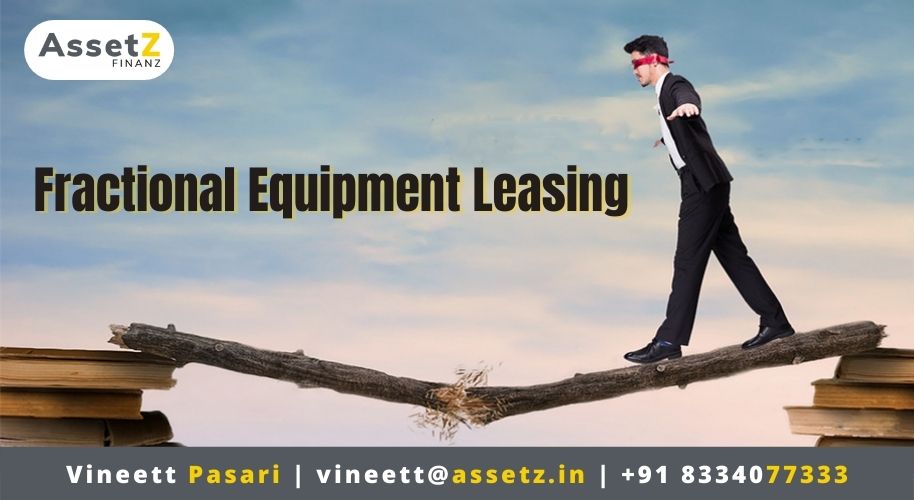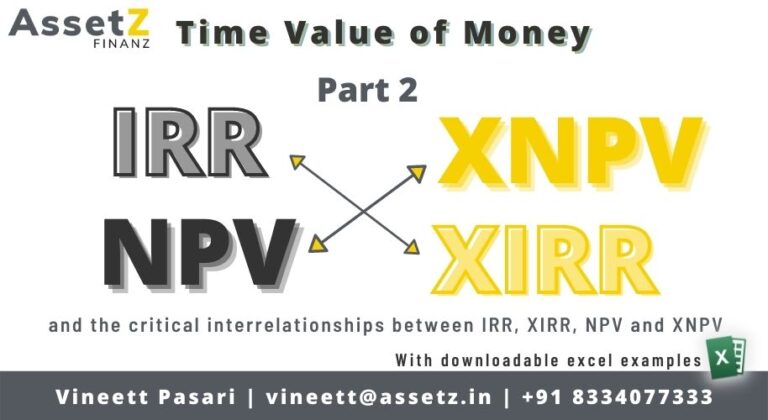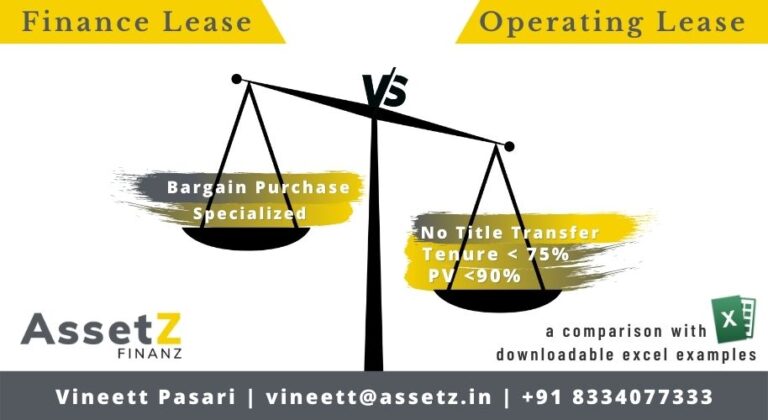Many people have reached out to me over the last few weeks and have asked me about Fractional Equipment Leasing. Fractional investing seems to be catching on in many asset classes including Real Estate and Equipment of all kind.
Personally, I believe, fractional equipment leasing in the current model is not advisable for investors.
The Current Fractional Equipment Leasing Opportunity.
Let me explain the basic construct first.
There is an anchor Fintech who, on one hand, will aggregate individuals promising a pre-tax return of 20% plus. This anchor Fintech will then use the money raised from the investors to lease equipment to many startups in the rental space who rent anything from laptops, bikes, electric vehicles, furniture and other assets to individuals and corporates.
The legal structure will consist of creating a LLP (Limited Liability Partnership) of the investing individuals as partners and then leasing the assets through this LLP to the rental startups (Lessee).
Sample Analysis Of A Term Sheet
I took a term sheet of one of the deals on offer. Here is what I understood. For an initial investment of INR 100,000/-
An investor will get around Rs. 1,21,581 post tax on an investment of Rs. 1,00,000/- over a 36 month lease term. Out of which, Rs. 21,581/- is realized in the 36th month on liquidation of the Residual Value at the agreed valuation. Which means the upside is only Rs. 21,581/- and is realized at the end of the term whereas the potential downside is loss of a significant portion of the investment if the startup fails anytime during the term.
Also the investors receive their money back on a monthly basis and they have to deposit that money again every month to keep earning interest. This effectively lowers the interest earned on the investment.
On the other hand, the effective rate which the Lessor is paying is way lower since the entire lease rental they pay is tax deductible!
Comparative risks
Let’s analyze the risks associated with Fractional Equipment Leasing in greater detail.
I have also tried to look at similar aspects of Venture Debt and Fractional Real Estate investments for a little better understanding however I must admit I am no expert on these.
1. General
a. Repayment structure
Your entire upside is tied up in the Residual value. This means that your entire upside is realizable only at the end of the term.
- Venture Debt: Payment is equated or even if structured, it has other safeguards built in.
- Fractional Real Estate: Payment is equated for only the interest portion in the form of rental.
b. Risk perception
The banking and investment world places these startups in high risk category.
As a leasing professional I have had the opportunity to lease equipment worth millions of dollar’s to many startups in India and I can tell you that all such leases were initially backed by a 70% to 100% Bank Guarantee or some other solid collateral. All funders demand similar collateral.
Please look at my post How Startups Benefit From Equipment Leasing to understand more.
- Venture Debt: They have specialist teams who understand the risk. They have the expertise to assess and monitor the same. They negotiate for additional equity, warrants and other instruments to gain from the upside if the startup succeeds.
- Fractional Real Estate: They have specialist teams who understand the risk.
c. Financial Credit Rating
Credit rating institutions like ICRA, CARE, FITCH provide financial ratings which reflect the financial health of organizations. I am reasonably sure that none of the Lessee to whom these Fractional Equipment Leasing companies are leasing equipment have any credit rating. The anchor Fintech is also unlikely to have an experienced team to assess and monitor the risks.
- Venture Debt: They have specialist teams who understand the risk.
- Fractional Real Estate Not Applicable.
d. Exit options during the term
If you want to liquidate your investment during the lease, there is only one option which is to approach other investors who may agree to buy your share. But if even one Lessee defaults, you can expect a scenario where all investors across other investments may rush to liquidate with no one willing to buy.
Closest example is maybe the recent plunge in bond prices of a large finance and leasing institutions which enjoyed a strong AA credit rating till a few years back.
- Venture Debt: Depends on deal structure.
- Fractional Real Estate: Similar risk but with underlying real estate the likelihood of everyone wanting to liquidate together will be remote.
e. Other covenants
There does not seem to be any collateral except the underlying asset. There is a small security deposit which is not enough to even cover the Residual Value.
- Venture Debt: Equity shares / warrants or other guarantees.
- Fractional Real Estate: Underlying real estate itself is a big safety net.
f. Skin in the game
When lending money, a bank will always insists that the borrower puts in his own equity also which is a good percentage of total funding required. If we look at this from the Lessee’s perspective, they are putting a small security deposit.
But what we should not miss is that the anchor Fractional Equipment Leasing promoters are practically putting in nothing.
If anything goes wrong, they are simply not liable at all. They hardly have any skin in the game!
- Venture Debt: They ensure borrower pitches in with good collateral.
- Fractional Real Estate: No skin in the game by the Fintech.
g. Source of funds
The investors in a Fractional Equipment Leasing company are generally salary holders or small businessmen. I do not expect them to have a very high risk taking capacity.
I think they will be better off doing a bit of research and investing money in stocks of few blue chip companies which can give them similar 15-18% returns over next few years. Its not difficult to narrow down on such opportunities with tremendous amount of analysis available on the internet.
- Venture Debt: Large PE Funds, Family Offices, HNI’s. Essentially sources which have much higher risk taking capacity.
- Fractional Real Estate: HNI’s and above.
2. Equipment
a. Underlying Equipment and Secondary Market
The only collateral the investors have is the underlying assets. All these assets are generally highly depreciating meaning the value falls rapidly over time. Some like charging stations etc. are either too niche, custom made or innovative and may not have any resale market at all. The anchor Fintech may not have any expertise on managing these equipment or access to a ready market to quickly liquidate them at a good price. In case of a default by the Lessee, these factors will play a major role in how much money you recover.
- Venture Debt: Depends on the deal structure.
- Fractional Real Estate: Real Estate which is a very strong collateral.
b. Ease of repossession in case of default
Repossession is nearly impossible as the equipment are low in value, more in quantity and are further distributed over a large number of users spread across a wide geographical area. The anchor Fintech also may not have any requisite legal and logistical expertise to deal with these challenges. Again, in case of a default, it is unlikely that anything will be recovered at all.
Please see the Talwalkar case study below.
- Venture Debt: Not Applicable.
- Fractional Real Estate: Comparatively much easier as the underlying real estate is owned by the investors and the regulations are better.
c. Appreciation potential of underlying assets
As mentioned earlier these are generally highly depreciating equipment which rapidly lose value over time.
- Venture Debt: Not Applicable.
- Fractional Real Estate: Real estate is a comparatively much safer investment.
3. Legal
a. Legal Structure
The leasing structure is actually a finance lease in substance but projected as an operating lease.
With more than a decade spent in equipment leasing which includes interacting with the biggest of audit and law firms and finest of consultants on all matters related to equipment leasing, I can say with certainty, this structure is a finance lease.
There are regulatory requirements for doing a Finance Lease transaction and non compliance has serious implications.
The liability is on the investors who are partners in the LLP. I don’t think a retail investor is either aware or ready to get into these troubles.
- Venture Debt: The structure is legal.
- Fractional Real Estate: The structure is legal.
b. Compliances with GST, Income Tax and other regulations
Any business today has stringent compliance requirements which include having several licenses, periodic GST returns, Income Tax returns etc. Violations are strictly monitored and are punishable with penalty and in some cases imprisonment. As a partner in a LLP the investor is directly responsible even though the investor may not be a designated partner.
- Venture Debt: Compliances are part of regular business.
- Fractional Real Estate: Compliances are lesser and easier.
c. Operational Creditor
The lease is being booked as an operating lease in the books of your LLP, in case the Lessee defaults, the courts will treat your LLP as an operational creditor.
Under current Indian IBC and NCLT laws, this brings its own challenges as Financial and Operational Creditors are treated differently.
- Venture Debt: Depends on deal structure. They are also likely to structure the deal to ensure that in case of a default they get preference for any repayments.
- Fractional Real Estate: Operational creditor but only the rental is at stake and not very difficult to take possession of the underlying real estate.
d. Lease Agreement
The operating lease agreement I have seen is not at all in line with similar agreements in the equipment leasing industry. It is full of loopholes which puts the Lessor (the LLP and the investors) in a very weak position.
This also raises serious questions on the expertise of the anchor Fintech in other areas including credit assessment, LLP formation and management, operational setup etc.
The Talwalkar's Case Study
I think a very public and appropriate case to recall here will be that of Talwalkar’s.
This famous fitness chain enjoyed a very high credit rating of AA till few years back. One of the lenders to Talwalkar’s was Tata Capital who leased fitness equipment to them in 2018 valued around INR 36 crores. Talwalkar’s however defaulted on the lease payments in 2019 after which Tata Capital swiftly approached the courts to repossess and sell the leased fitness equipment.
We should be aware of the following points and compare with the current Fractional Lease offerings.
- Talwalkar’s enjoyed a very high credit rating and could avail of huge direct loans from banks unlike the Lessees here.
- The lessor, in this case Tata Capital, had deep expertise to analyze such deals unlike an anchor Fintech offering Fractional Equipment Leasing.
- The equipment was spread only over the fitness studios of Talwalkar’s unlike in many cases here with the equipment being more widely distributed across individual renters of these Lessees.
- Many of these fitness studios were taken on rent where I believe the landlords would have denied permission to remove anything till their pending rent was cleared.
- It would be near impossible to sell such used equipment and in such numbers. Even storing them after repossessing would entail a cost.
There are many other such instances of large and well established Lessors being unable to either repossess or sell off the equipment in case of a default by the Lessee.
Startup Risk
The Lessees here are some of the most successful and exciting startups and are run by the best our country has to offer. They are constantly innovating and creating new business models. Most are already very successful and will probably give 20x to 100x returns to their investors.
The optimist in me says these startups are already successful, already have a comfortable fund raise and a proven business model and will of course not default. But when I look into the mirror, the conservative finance person I see, has different views.
A startup is a startup and we need to understand that a Private Equity player or a Venture Debt company understand the huge risks they are taking and therefore ensure that they structure the deal in a way that they also share the profits and valuations if the startup succeeds.
The Fractional Equipment Leasing investors are taking the same risks but are not getting similar benefits.
Conclusion
The financial and credit risk associated with the Fractional Equipment Leasing opportunity seem to be very high. On careful analysis it seems the returns are just marginally higher than a investment grade AAA / AA rated bond but the risks are way higher. It is important that the investors understand these risks.
The bigger concerns however, are the compliance and the legal risks.
As an ordinary individual you may not have the patience, the resources and the experience to handle these issues if things go wrong.




